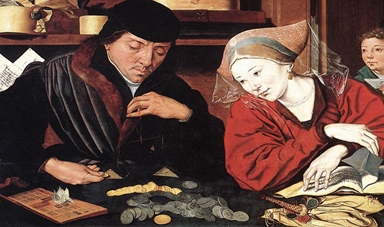Loading component...
At a glance
The Roman emperor Augustus was the first leader to publish accounts, while George Washington silenced critics after he made his private spending records public.
History provides many such examples of people who understood accounting and used it to reshape nations, financial sectors and wider markets.
1. The Romans open the books
The Romans kept detailed records of their activities and began the tradition of publishing accounts to show where money was spent.
The first emperor, Augustus, set up imperial account books and established a tradition of publishing data from them.
Augustus used his accounts for propaganda – to publicise his personal spending – but accounting discipline also enabled him to plan projects and think about how the empire was managed.
In his book, The Reckoning, US historian Jacob Soll says Augustus’ attention to the accounts enabled Rome to flourish. Regarded as the father of the Roman Empire, Augustus famously said he found Rome a city of bricks and left it a sparkling city of marble.
Soll’s book takes readers back 700 years to show how accounting is at the heart of building businesses, states and empires
2. The Medicis use double-entry accounting to win client loyalty
The Medici family of 15th century Florence adopted double-entry accounting to keep track of the many complex transactions moving through accounts.
This enabled the Medici Bank to expand beyond traditional banking activities of the time. It set up branches and offered investment opportunities, as well as making it easy to transfer money across Europe using exchange notes that could be bought in one country and redeemed elsewhere.
The Medicis’ financial machine allowed them to dominate their age at a time when Florence was the centre of the world for trade and education.
3. Accounting builds trust in Holland
By the early 16th century, the Netherlands was the richest European province of the Spanish Empire and as business grew, accounting became a central element of Dutch education.
Strong trust between government, businesses and people developed from consistently good financial management. That gave the Dutch the faith to take massive financial risks, investing in stocks and ships that traded around the world.
4. Accounting knowledge saves Britain
Sir Robert Walpole, generally regarded as the nation’s first prime minister, was a brilliant accountant and used accounting knowledge to save financial markets when the South Sea Company scheme collapsed in the 1720s.
As first lord of the Treasury, Walpole negotiated a bailout involving the Bank of England, at a time when public confidence had plummeted and many individuals and businesses faced ruin.
In contrast, a similar collapse happened in France the same year, but the French Government had limited financial literacy and had to borrow at unsustainable rates. This led to a loss of public confidence and kept the French economy in a slump for most of the 18th century.
5. Josiah Wedgwood develops cost accounting theories
Industrialisation in the 1700s enabled manufacturers to make a huge variety and quantity of goods, but they often didn’t know their cost of production. Industrialist and anti-slavery campaigner Josiah Wedgwood developed cost accounting and accounting theories around pricing and costs.
Wedgwood’s insights enabled his chinaware company to ride out a recession in Europe in 1772, says historian Daniel Drake in his article Dinnerware & Cost Accounting? The Story of Josiah Wedgwood: Potter and Cost Accountant.
By gaining economies of scale, Wedgwood was also able to price pottery for the middle classes, an entirely new market for his company.
Wedgwood passed accounting discipline onto his family. His grandson, Charles Darwin, kept detailed accounts books and was a successful investor. Darwin saw a link between his lists of species showing the course of evolution and the world of balance in accounting.
6. Liberty, equality, accountancy
France had enormous debts by the 1770s, when King Louis XVI appointed Swiss banker Jacques Necker to run the nation’s finances.
In 1781, Necker published an account of the crown’s finances, which previously were kept secret.
These showed the king lavished on his brothers five times more money than he spent on upkeep of capital and 10 times more than he devoted to hospitals, writes Jadon B. Smith in his paper France’s Financial Crisis: Analyzing the Role of the Finance Minister.
The revelations shocked the public and Necker was sacked, but the debate on public finances and accountability continued to rage, propelling France toward the revolution in1789.
7. George Washington publishes his accounts
Controversy around the personal finances of US presidents is not new. George Washington, the first US president, published his personal accounts when enemies accused him of profiting from the War of Independence.
A rich and innovative farmer, Washington kept detailed accounts that show he enjoyed the finer things of life: Madeira wine, luxurious clothes and expensive food.
It was a risky move to publish accounts that showed he spent more on banquets than his generals earned in a month, but the astute Washington countered criticism by refusing to accept a salary as commander-in-chief of the army.
Six years later, he was elected president. He established the new government’s executive and administrative procedures and is still considered one of the most able administrators to serve as president.
Sources
- The Reckoning, by Jacob Soll, published by Basic Books.
- Dinnerware & Cost Accounting? The Story of Josiah Wedgwood: Potter and Cost Accountant, by Daniel Drake, published by The HQ Companies.
- France’s Financial Crisis: Analyzing the Role of the Finance Minister, by Jadon B. Smith, published by Bound Away: The Liberty Journal of History.

